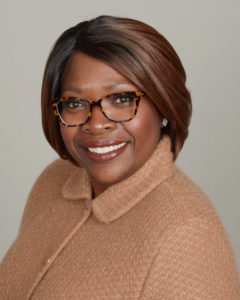Like a lot of alumni, Orinthia Montague (’90) cites Truman as the foundation of her academic success. She went on to earn a master’s degree from Lindenwood University and a Ph.D. from the University of Missouri, and she has spent much of her career in higher education. The coming academic year will mark her first as president of Tompkins Courtland Community College in Dryden, N.Y. Small things can make a big difference, and in Montague’s case that may be true. Her reason for choosing Truman – the place she feels started her career path – stems from sharing a bathroom with her four sisters.
“This will sound crazy, but at the time I knew I did not want to attend a school where I had to share a bathroom with a floor full of girls,” she said. “After visiting Truman, I realized it was the right size and the atmosphere really was a fit for me.”
Montague had a fulfilling time on campus. Step shows and parties are now more memorable than her bathroom situation, and she did a lot of community service in town as a member of Alpha Angels, the little sister organization of Alpha Phi Alpha fraternity. Academically, she felt supported too, specifically by her advisor Paul Mineo and Dwyane Smith, the director of the Multicultural Affairs Center.
“There were just so many people at Truman committed to my success, not just in the classroom, but as a global citizen,” she said.
A practicum experience under Smith is what really sparked her interest in higher education. A first-generation college student, Montague found there were many things she did not know when she arrived on campus, and she was motivated to help others.
“I wanted to be a part of the other side of the higher education arena that serves as a support net for students,” she said.
In her new role at Tompkins Courtland, Montague will be empowered to do just that, but it might not always be easy. Decreased funding to support students and success initiatives are pressing issues in higher education. To address that, she plans to seek opportunities to leverage her institution’s resources and collaborate with community partners.
Another tricky issue she will have to navigate is the relationship between enrollment and outcomes. Community colleges are designed to provide access and opportunity for a breadth of students, but that can cause difficulties, something she hopes to address as president.
“Even though we accept students at various preparation levels, we are being held to the same outcome standards as institutions with rigorous entrance requirements,” Montague said. “Our challenge as community college presidents is to find a way to address this misalignment of expectations, which is typically tied to funding.”
As far as her specific goals at Tompkins Courtland, Montague wants to build on the positive campus culture, address issues of enrollment and find ways to support student retention and engagement. She is pleased with the faculty and staff under her employ and has a positive outlook on the future.
“Tompkins Courtland is a school poised to move forward in its growth success,” she said.


